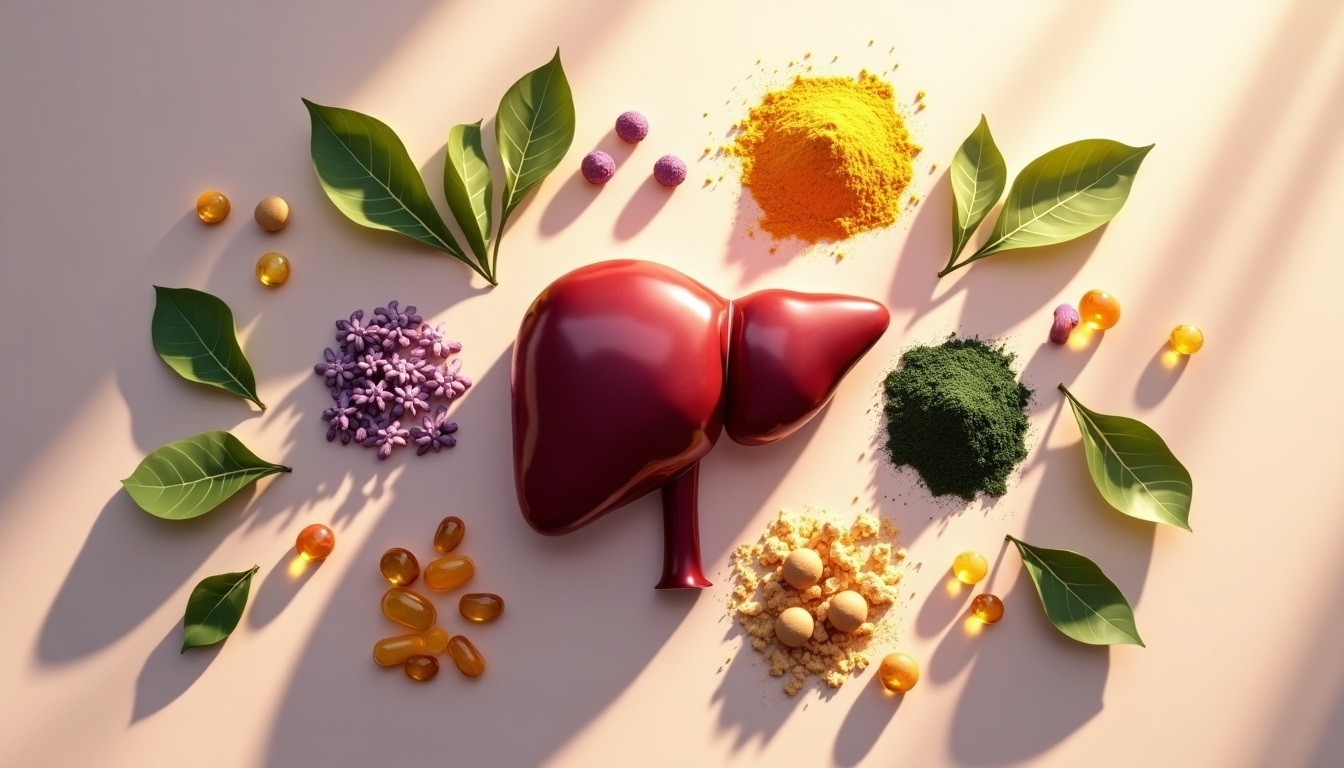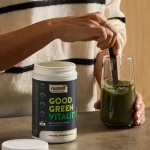

Your liver handles over 500 vital functions in your body. Most people don’t think about this significant organ until something goes wrong. The liver never stops working to keep you healthy by processing nutrients and filtering toxins.
People want natural ways to protect their liver health. That’s why liver supplements have become popular lately. The best supplements for liver health provide nutrients that keep your liver working at its best and support natural detoxification.
Recent studies reveal that about two million UK residents live with some form of liver disease [1]. Your liver health might need supplemental support, but you need to recognise the warning signs and understand what makes supplements work effectively.
Your body sends subtle hints when your liver isn’t functioning properly. Look out for these common signs:
More concerning symptoms include yellow skin and eyes, stomach pain that won’t go away, and dark urine [3]. These signs mean you should see a doctor right away instead of trying supplements.
The liver’s natural processes get a boost from supplements that provide vital nutrients. Your liver works as your body’s main philtre by turning toxins into waste while processing nutrients and medications [4].
Good quality supplements help your liver in several ways:
The success of liver supplements depends on various elements. People who already have liver issues might process supplements differently [5]. The quality and makeup of supplements matter too, since many products don’t face FDA regulation [4].
Some dietary supplements can actually damage your liver through drug-induced injury [4]. This risk shows why you need to talk to your healthcare provider before starting supplements, especially if you have liver problems [5].
Lifestyle choices play a big role in how well liver supplements work. Research shows that drinking alcohol, being overweight, and having type 2 diabetes can affect your liver health by a lot [3]. Supplements work best as part of a healthy lifestyle rather than a standalone fix.
Vitamins are vital for your liver’s health. Some vitamins stand out as excellent supplements that support liver regeneration and protect it from damage.
Vitamin E is a powerful antioxidant that helps your liver stay healthy. Research shows that non-diabetic adults with active liver conditions benefit from taking 800 IU of vitamin E (RRR-α-tocopherol) daily [6]. Your liver benefits from Vitamin E in several ways:
Studies show that vitamin E likely reduces major liver enzymes, including alanine transaminase and aspartate aminotransferase levels [7]. Scientists need more research to understand its effects beyond 24 months.
B-vitamins work as a team to help your liver detoxify. These water-soluble vitamins support different liver functions [8]:
B-complex supplementation becomes essential especially when you have chronic liver conditions. These vitamins maintain proper methylation and detoxification pathways [9]. Research suggests that genetic variations affect B-vitamin use in up to 40% of people [9].
Fat-soluble vitamins need special attention in liver health supplements. Up to 93% of chronic liver disease patients lack vitamin D [10]. This makes vitamin D a key component of liver health supplements.
Vitamin D helps your liver in multiple ways:
Fat-soluble vitamin supplementation needs careful monitoring. People with severe liver conditions may not absorb and process these vitamins well [11]. You might need special formulations to absorb these vitamins properly if you have cholestatic liver diseases [8].
The timing and amount of fat-soluble vitamins matter greatly for liver health. Doctors often check vitamin D levels and aim for 30 ng/mL [12]. This tailored approach ensures you get the right amount of supplements without taking too much.
Minerals are vital supplements for liver health that work with vitamins to support optimal liver function. Research shows these nutrients can substantially affect liver health outcomes if you supplement them properly.
Zinc is a vital mineral for liver function. Studies show it helps with DNA synthesis, cell division, and protein production [4]. People with liver conditions don’t have enough zinc in their bodies, especially those with alcoholic liver disease. This deficiency shows up as:
Research shows that taking 50 mg of elemental zinc daily can help reverse deficiency symptoms in liver disease patients [4]. You should take this dosage with meals to avoid side effects like nausea.
Magnesium plays a crucial role in liver health. Research reveals that each 100 mg increase in magnesium intake reduces liver disease mortality risk by 49% [13]. Most US adults – up to 79% – don’t get enough daily magnesium [13].
People with fatty liver disease often lack magnesium [13]. Magnesium supplementation helps improve insulin resistance and reduces inflammation markers in these cases [14].
Selenium protects liver health through its powerful antioxidant properties. Studies show that patients with non-alcoholic fatty liver disease (NAFLD) have lower selenium levels than healthy individuals [5]. This mineral serves several vital functions:
Selenium supplementation helps improve metabolic disorders by targeting oxidative stress and inflammation [5]. Note that both too little and too much selenium can affect liver function, so proper dosing under healthcare supervision is essential.
These mineral supplements work differently based on your individual factors and conditions. Magnesium works best for alcohol users [13], while zinc shows the most promise in treating alcoholic liver disease [4].
Natural herbal supplements have got a lot of attention because they might protect your liver. Studies show these plant-based remedies can be great supplements that boost liver health.
Milk thistle stands out among herbal supplements that support liver health. Silymarin, its active compound, shows remarkable protective qualities. Studies show that silymarin acts as a powerful antioxidant that works ten times better than Vitamin E [15].
Key protective mechanisms of milk thistle include:
Studies show milk thistle works well against alcoholic hepatitis and cirrhosis [15]. But research on conditions like hepatitis C shows mixed outcomes [16].
Dandelion root has become a valuable liver health supplement that helps your body’s natural cleansing process. Research shows dandelion root helps remove toxins better and makes more bile [15].
A newer study, published by Korean researchers, showed how dandelion root protects against environmental toxins, alcohol, and chemicals [15]. Dandelion root packs plenty of antioxidants that shield liver cells from damage and curb harmful free radicals [17].
Scientists found that dandelion root extract might prevent serious liver issues. The extract can lower high liver markers and reduce oxidative stress [17]. These findings suggest dandelion works well to maintain liver health.
Turmeric has got attention because it protects the liver, mainly through its active compound curcumin. Research shows turmeric helps your liver in several ways:
Studies show eight weeks of turmeric supplements cut down blood markers of liver stress by a lot [18]. Note that the Therapeutic Goods Administration received 18 reports of liver problems from people taking turmeric supplements [19].
Safety considerations: These herbal supplements show promise, but taking the right dose matters. Milk thistle is usually safe at proper doses [16], but you should be careful if you have hormone-sensitive conditions. Turmeric products made for better absorption might rarely cause liver problems [1].
You should ask your healthcare provider before starting any herbal supplements, especially if you have liver issues or take medications. This step helps prevent bad reactions and lets you get the most from these natural liver supplements.
Amino acids and antioxidants stand out as promising supplements for liver health. These compounds protect the liver by curbing oxidative stress and supporting cellular repair. They work together to keep liver function optimal and help with detoxification.
N-acetyl cysteine (NAC) is a powerful supplement for liver health that helps produce glutathione. Studies show NAC can reduce liver enzyme levels and spleen size by a lot in patients with non-alcoholic fatty liver disease [20].
NAC doses up to 3 grammes per day are safe, and patients report no side effects [21]. The best results come from consistent NAC supplementation. Studies show that using it for 12 months gives the best benefits in reducing liver fat accumulation [22].
Glutathione, the body’s master antioxidant, plays a vital role in liver health. Research shows that taking oral glutathione supplements at 300 mg daily for four months can reduce ALT levels and boost liver function [23].
The success of glutathione supplements depends on:
Research reveals that protein-bound glutathione levels rise 1-2 hours after taking the supplement, which shows it enters the bloodstream successfully [23]. This finding challenges older beliefs about glutathione’s poor oral absorption.
Alpha-lipoic acid (ALA) shows great potential as a liver health supplement through its unique antioxidant properties. Studies prove that ALA blocks harmful liver cells and reduces collagen buildup in liver tissues [24].
ALA’s liver-protective mechanisms include:
Clinical studies show ALA supplements can improve liver health by reducing insulin resistance and liver inflammation [6]. But doctors should monitor ALA use carefully since rare cases of liver injury have been reported [7].
These supplements work best with proper timing and dosage. NAC shows optimal results with consistent long-term use [22], while glutathione works best at 300 mg daily [23]. If you have liver conditions, doctor supervision ensures safe and effective supplementation.
These amino acids and antioxidants are among the best supplements to support liver health, especially combined with lifestyle changes. They complement other liver-supporting nutrients to create an integrated approach to maintaining liver health.
Safe and proper usage guidelines are vital for anyone taking liver health supplements. These supplements can help your liver function better, but their success depends on how you take them and what other medications you might be using.
You need to understand the right dosage levels to supplement safely. Research shows milk thistle is safe if you take 420 mg/day in divided doses for up to 41 months [25]. Studies recommend these doses for specific conditions:
200-400 mg daily of silymarin for liver disorders of all types [25]
140 mg silymarin three times daily for hepatic cirrhosis [25]
10 micrograms (400 IU) of vitamin D daily for general liver support [11]
400 micrograms of folic acid daily for simple liver maintenance [11]
Keep in mind: High doses of certain vitamins, especially vitamin D, can be dangerous because your body struggles to get rid of excess amounts [11].
Your supplements will work better if you time them right and help your body absorb them. Research points to several strategies that can help:
Research shows that compounds like silymarin in milk thistle don’t dissolve well in water, which makes them less effective as tea [25]. Standardised extracts give you better therapeutic results.
Critical safety alert: Research shows that one-third of people who take supplements face possible supplement-drug interactions that could harm their liver [9]. You should watch out for these interactions:
These supplements need careful monitoring:
Studies show that supplement-drug interactions happen more often in patients who already have liver conditions [9]. The risk goes up 1.14 times if you have
hepatic comorbidities [9].
Problems are more likely to happen especially when you have:
Liver injury from botanical products has gone up substantially, jumping from 7% in 2004-2005 to 20% in 2013-2014 [8]. These numbers show why careful supplement selection matters so much.
You should talk to your healthcare provider because supplements can change how your liver processes medications [26]. This becomes even more important since most supplement products contain multiple ingredients, and studies show more than half have incorrect labels [8].
To stay safe and get the best results:
The supplement industry works nowhere near the same way as pharmaceutical companies when it comes to regulations [8]. You need to be extra careful when choosing products. Working with registered dietitians can help you create safe supplement plans since they’re legally regulated nutrition experts [11].
Liver health supplements provide great benefits if you use them correctly as part of a detailed health strategy. Scientists have shown that specific vitamins, minerals, herbs, and amino acids help support your liver’s function and protect it from damage.
Your success with liver supplements depends on quality products and proper dosage guidelines. Research proves these supplements work best with healthy lifestyle choices. They should not be your only solution.
You need to talk to your healthcare provider before starting any liver supplement regimen. This step becomes vital if you have existing liver conditions or take medications because supplement interactions might affect your liver’s function.
Scientists keep discovering new things about these beneficial compounds. The best way to maintain your liver’s health comes from thinking about your individual needs and choosing the right supplements.
Q1. What are the most effective supplements for liver health?
The most effective supplements for liver health include vitamins B and E, zinc, magnesium, milk thistle, and N-acetyl cysteine (NAC). These supplements support liver function, aid in detoxification, and provide antioxidant protection. However, it’s essential to consult a healthcare provider before starting any supplement regimen.
Q2. How quickly can the liver heal itself?
The liver has remarkable regenerative abilities, but healing time depends on the type and severity of damage. For mild cases, positive changes can be seen in as little as seven days when adopting healthier lifestyle habits such as reducing alcohol intake, eating a balanced diet, and exercising regularly. However, more severe liver conditions may require longer-term medical intervention and lifestyle changes.
Q3. Which foods are particularly beneficial for liver health?
Foods that support liver health include oatmeal, broccoli, almonds, and green tea. These foods are rich in fibre, antioxidants, and nutrients that aid liver function. It’s also important to stay hydrated and limit intake of fatty and sugary foods, which can strain the liver.
Q4. Are there any drinks that can help support liver function?
While there’s no magic “liver flush” drink, certain beverages can support liver health. Water is crucial for hydration and helps the liver’s detoxification processes. Other beneficial drinks include lemon water, green tea, and ginger water, which contain antioxidants and anti-inflammatory compounds that may support liver function.
Q5. How important is healthcare provider consultation when taking liver supplements?
Consulting a healthcare provider before starting any liver supplement regimen is crucial. This is particularly important for individuals with existing liver conditions or those taking medications, as some supplements can interact with drugs or affect liver function. A healthcare professional can provide personalised advice on safe and effective supplement use based on individual health needs.






Accepting payments via


YourHealthBasket © 2025
detoxpeople Ltd
Registered in England & Wales 07156741
VAT reg GB 103 3641 60
Our new practitioner portal has been released and it’s now easier than ever to link a client’s account and provide them with suggestions using our new protocol system.
Convert your current cart into a protocol which can then be assigned to a linked client.